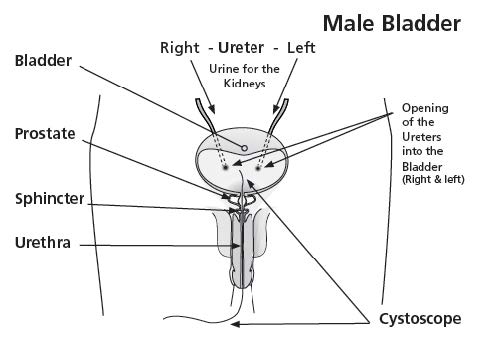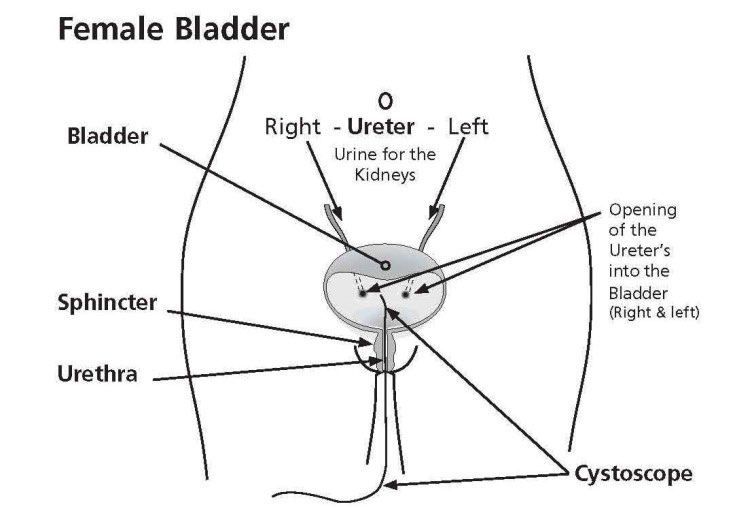What is a Flexible Cystoscopy?
A flexible cystoscopy is a test that allows the doctor to look directly at the lining of the bladder, from the opening of the urethra.
During the procedure a thin flexible ‘fibre-optic’ tube called a cystoscope is passed through the urethra (opening to the bladder). The end of the cystoscope contains a light and conveys images to a viewing screen allowing the doctor a clear view of the bladder lining. As well as looking at the lining, biopsies (small pieces of tissue samples – for examination under microscope) can be taken.
The test is usually carried out to investigate bladder symptoms such as blood apparent in urine, recurrent urine infections, abdominal pain or abnormalities revealed by other investigations.


What do I need to know before admission?
You will be asked to attend the Hospital and you can expect to be in the department between 1 and 2 hours. Please may we request that you do not come to the unit before your appointment time. Prescribed medication can be taken as normal on the day of your Cystoscopy. There is also no need to fast for the procedure, so please eat and drink as normal.
What happens on admission?
Once you have arrived at the Unit a nurse will complete an admission document with all your personal details. She will explain the procedure to you, and inform you of the potential risks and complications of the flexible cystoscopy and also answer any questions you may have. The nurse or Scopist will then ask you to sign the consent form for the procedure (once you have read it carefully and understood it in full).
You may be asked to provide a sample of urine, which will be sent to the pathology department after the cystoscopy. If any abnormalities are found you will be notified by the Urology Team.
You will be taken into a changing room and supplied with a gown and dressing gown for you to change into. You need to keep your clothes with you and you will be provided with a bag to put them in. There will be a member of staff with you throughout the procedure.
Cancellations or Delays
Please be aware that in some circumstances your procedure may have to be delayed or cancelled at short notice. If this occurs we apologise for any inconvenience caused and will aim to reschedule your appointment as soon as possible.
What happens during the Flexible Cystoscopy?
You will be taken to an examination room for the procedure. The nurses will help you lay down in the correct position on a couch, resting on your back. A nurse will stay with your throughout the test.
The procedure will be carried out as follows:
- The genital area is washed with an antiseptic lotion. Then some local anaesthetic jelly is inserted into the urethra (this might sting a little). It acts as a lubricant as well as numbing the area. The cystoscope is then inserted into the urethra and into the bladder. Fluid attached to the cystoscope is released into the bladder to expand it; this is to give the doctor a clear view of the internal surface.
- If the doctor finds any change in any tissue a tiny piece may be removed (biopsy) using instruments passed through the cystoscope. Any samples of tissues removed are sent to the laboratory for specialist examination.
The procedure lasts from 5 to 10 minutes. During the procedure you may feel as if you need to pass urine. Some patients may find the procedure uncomfortable, however we take as many precautions as possible to minimise any discomfort.
What happens after the Flexible Cystoscopy?
You will need to pass urine as soon as the procedure is finished. You can then get changed and the nurse will organise a drink for you.
You may find that you pass blood stained urine initially and that it stings when you go to the toilet. It is important that you drink following the procedure to flush out your bladder. The nursing staff will generally assess how you have recovered from the procedure. If you feel unwell at all please let the staff know.
If you are unable to pass urine you will be asked to stay in the department until you can. Once ready to leave the nurse will speak to you about your cystoscopy, answer any questions you have, and will give you a copy of your discharge letter.
Discharge Advice
Drink plenty of fluids – at least 3 pints of water or squash. Avoid caffeine (coffee, tea, cocoa, colas) and alcohol for 2 days.
Having urine that is pink in colour as well as passing some small clots is normal following this procedure. As you urinate more, your urine will return to normal.
Carry on with normal activities according to how you feel. Avoid strenuous physical activity especially heavy lifting.
Pain – if you experience discomfort following your cystoscopy simple analgesia like paracetamol is recommended.
It is normal to have a small amount of bleeding (especially if you have had biopsies taken) and burning the first few times you pass urine however this should settle quite quickly especially if you drink plenty.
Benefits
The procedure enables us to have a direct vision of the bladder and the urethra, to aid diagnosis and treatment.
Risks
It is very important that you are aware of the potential risks and complications of flexible cystoscopy before giving your consent to the procedure. These include:
• Internal Bleeding (Haemorrhage)
This may occur at the site of a biopsy. The bleeding is usually resolved without any treatment but in a minority of cases may be serious. If you pass large clots of blood or if your urine is bright red you must seek medical advice.
• Infection
This may happen to some patients and is partly why we ask for a urine sample prior to the procedure. All precautions possible are taken to prevent infection. If you develop a fever or have persistent pain and burning when passing urine you must seek medical advice. It is also important to remember that if you pass small amounts of urine frequently this may be a sign of infection and therefore you should consult your General Practitioner (GP).
• Urine Retention
This is the inability to pass urine. If this occurs you must seek medical advice.
• Perforation
If you develop severe lower abdominal pain and / or your tummy becomes noticeably more bloated / swollen (distended) you must seek medical advice. This can be a potentially serious complication, although it usually settles without surgery being necessary.
Every effort is made to reduce the risk of these complications occurring. If you are concerned about any of these risks and complications, please discuss this with the consultant or member of their staff before the procedure.
Alternatives
It may be essential to have a cystoscopy in order to diagnose some bladder conditions. The cystoscope enables the doctor to view parts of the urethra and bladder that tend not to show up well on X-rays.
In certain circumstances it may be possible to undertake another form of cystoscopy, using a rigid rather than a flexible instrument. However this is used for giving treatment to the bladder and urinary tract rather than for a diagnostic investigation. This type of procedure would be done under a general anaesthetic.
Reference Section
Sources of Further Information / Support
Cancer BACUP
3 Bath Place,
Rivington Street,
London,
EC2A 3JR
Tel: 020 7696 9003 or Freephone 0800 181199
Fax: 020 7696 9002
Macmillan information on cystoscopy for bladder cancer
Contact Details for Further Information
If you have any questions or concerns, please contact the Urology Team 03033 306534
Normal Hours: 08:30 – 17:00 Monday to Friday
Out of Hours please contact your GP/ GP Out of Hours or attend Accident & Emergency.
Any Comments, Compliments, Concerns or Complaints
If you have any other concerns please talk to your nurse, therapist or doctor. Our Patient Advice and Liaison Service (PALS) is available on 03033 306518 (Grimsby, Scunthorpe and Goole). You can also contact [email protected]
As a Trust we value equality of access to our information and services, therefore alternative formats are available on request at [email protected]
Review information
Date of issue: March 2022
Review Period: February 2025